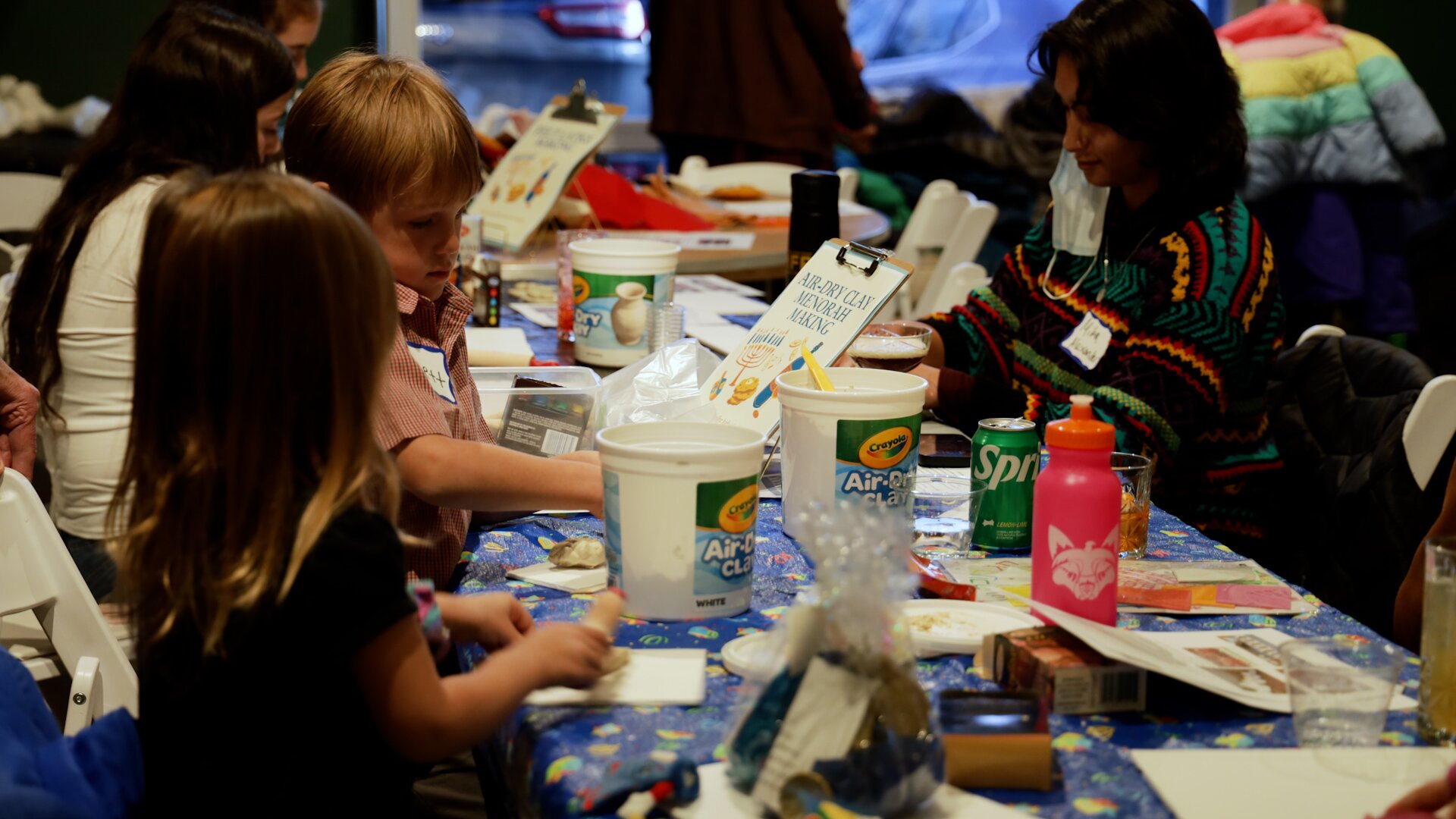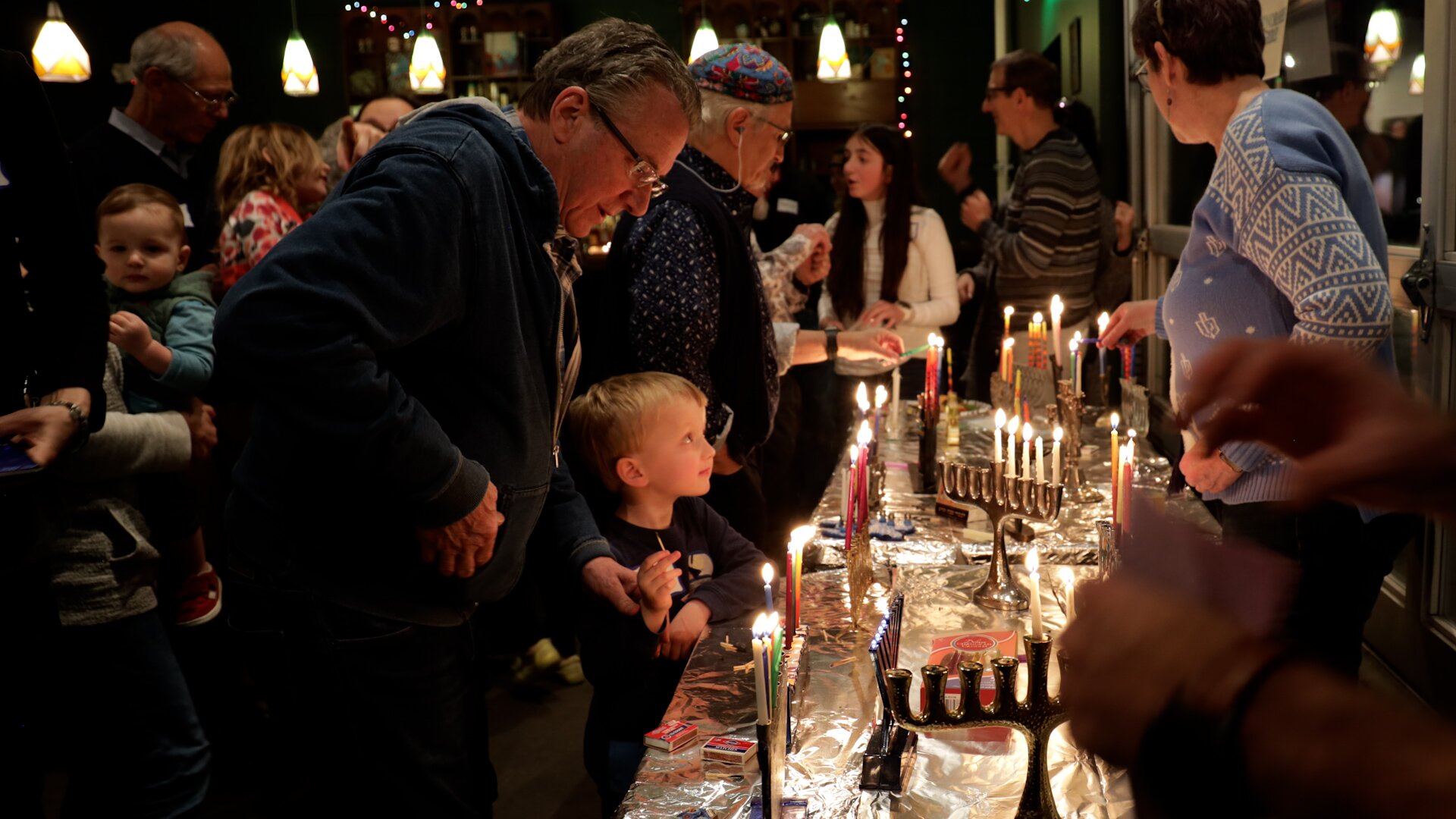'Defiant joy': Denver’s Jewish community celebrates Hanukkah

DENVER — As darkness clouded the sky and the winter temperature dropped, members of B’nai Havurah — a Jewish congregation in Denver — danced, laughed, ate and celebrated the fourth day of Hanukkah.
Hanukkah — spelled Chanukah in Hebrew — is an eight-day Jewish celebration that takes place every winter. The celebration is also known as the “Festival of Lights,” because each day is commemorated with a prayer and lighting of a hanukkiah, or menorah.
The story of Hanukkah is rooted in revolt and perseverance. In the second century BCE, the Jewish people, led by a group of rebels known as the Maccabees, revolted against the oppressive rule of the Seleucid king Antiochus IV. The revolt resulted in the recapture and purification of the Second Temple in Jerusalem.
For Jewish people, the miracle of oil is a central theme of the celebration. According to tradition, the Maccabees who rededicated the Temple had limited oil expected to light the menorah for only one night. Miraculously, the oil lasted for eight days, symbolizing the duration of the rededication celebration.
“The miracle was that they still lit the candle. They did the process even if they didn't know that it would ever turn out OK,” said Rabbi Katie Mizrahi. “In my mind, that's a moment of great divine human partnership where people did their part, they lit the light, and god came back and sustained it.”
Each night of Hanukkah, a candle is lit on the menorah, starting with one candle on the first night and adding an additional candle each subsequent night until all eight candles, plus the central or "shamash" candle, are burning. Traditional foods like latkes (potato pancakes) and sufganiyot (jelly-filled donuts) are often enjoyed.
The celebration falls during the darkest time of year, which Mizrahi said makes coming together as a community particularly important.
“When we light the Hanukkah candles, we’re lighting a light in a time of great darkness even if we may not know how it's going to be enough,” Mizrahi said. “I think it's important when facing darkness to remember that we can do something. Even if we don't know how to do everything that's needed, we can do our own part.”
The festival at Town Hall Collaborative included two bands — one comprised entirely of Jewish members — latkes, donuts and other foods. Children made menorahs out of air-dried clay and glued together felt latkes with craft supplies.
Mizrahi said her congregation opted to hold the festivity at a secular gathering space instead of their synagogue, so it felt more approachable to those who are culturally Jewish, Jewish-adjacent or not Jewish but who still want to participate in joyful moments.
Children at a Hanukkah celebration hosted by B’Nai Havurah make menorahs out of clay and latkes out of felt. Photo: Andrea Kramar, Rocky Mountain PBS
“I think that in our moment, a lot of people would say they are spiritual but not religious and that's the kind of people who are often part of our community at B'nai Havurah,” Mizrahi said.
Difficult times for American Jews
This year’s celebration also included three security guards — a first for the congregation — and one Mizrahi said felt disappointing but necessary.
“Since Oct. 7, there has been a real rise in acts of hate against the Jewish community as well as the Muslim and Arab community, so our members felt that it was important to have additional security presence, both for our own safety and also for our own peace of mind,” Mizrahi said.
On Oct. 7, members of Hamas, a Palestinian militant group that the United States and European Union identified as a terrorist organization conducted a surprise attack in Israel 15 miles from the Gaza border, where Hamas governs. According to news reports, around 1,200 Israelis died in the attack and Hamas took 240 people hostage.
Israel responded by waging war against Hamas in Gaza. As of Dec. 9, at least 17,487 Palestinians have been killed. The majority of the deaths have been women and children. United Nations humanitarians warned last week that “society is about to break down” in Gaza amid the continued bombardment of the strip and ongoing blockade of food, water and aid.
Since the Oct. 7 attack, antisemitic attacks in the United States have risen nearly 400%, according to the Anti-Defamation League, which tracks such attacks.
While those at B’nai Havurah’s celebration said they felt their personal safety was largely in-tact, standing in solidarity with Jews around the world who are in danger is crucial.
“I think it’s harder to celebrate a joyful holiday right now,” said Debbie Goodman, a program coordinator at B’nai Havurah. “But I think it’s important that we do, in recognition of our ties to Jews all over the world and hoping for better days all over the world in Israel and in Gaza.”
“I’ve been really scared that the hatred — whether it’s for the Jews or the Palestinians in our community — is just ratcheting up,” said Laura Intfen, director of administration at B’Nai Havurah. “I’m worried that there’s a boiling point, and I don’t know what that is, and I don’t know what will make it boil, so there’s a lot of fear.”
Participants at a Hanukkah celebration on Sunday hosted by B’Nai Havurah. Photo: Andrea Kramar, Rocky Mountain PBS
Defiant joy
Those who attended the Sunday Hanukkah celebration said the holiday’s original meaning — of Maccabees prevailing over oppression — felt particularly important. As antisemitic crimes are on the rise and the world’s only Jewish state is at war, many attendees said the idea of celebrating was difficult.
“For the community, I think it’s a matter of defiant joy,” Intfen said. “It has been so hard on the community since Oct. 7. There’s so much fear, and this holiday reminds us that there’s always light, no matter how we’re feeling.”
The Oct. 7 attack also took place during the festival of Sukkot — a seven-day Jewish holiday. That evening, B’Nai Havurah congregates gathered to dance and find joy in the Torah Jewish religious text.
“Wherever there’s darkness, the thing that brings us joy is light and community,” Intfen said. “The more we get together, the more joy we can create in defiance of the darkness.”


